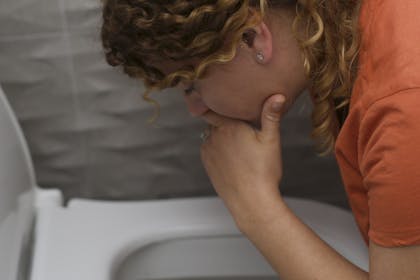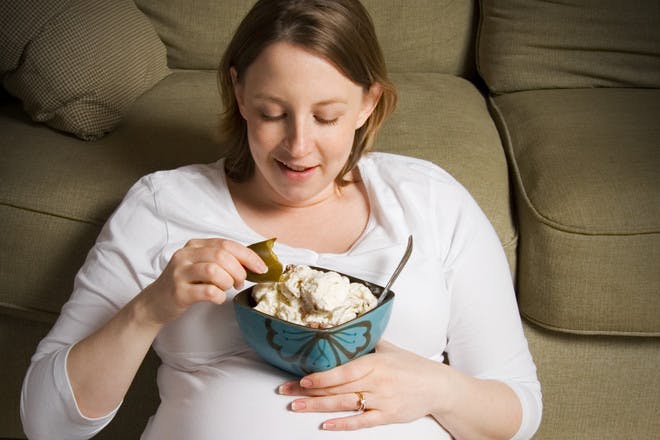One of the less pleasant symptoms of expecting, morning sickness can start early on in pregnancy and last right up to the second trimester – sometimes longer. Affecting 80% of expectant mums, here's what's causing those waves of nausea and bouts of vomiting, which can occur all day and all night, despite what the name suggests.
This page contains affiliate links, which means we may earn a small amount of money if a reader clicks through and makes a purchase. All our articles and reviews are written independently by the Netmums editorial team.
What causes morning sickness?
There is no scientific evidence on the exact causes of morning sickness, but it's thought that hormonal changes in the first 12 weeks of pregnancy are likely to play a role.
Key factors are thought to include:
- an increase in levels of the hormone oestrogen
- production of the pregnancy hormone, hCG (human chorionic gonadotropin)
- stress hormones (cortisol)
- low levels of vitamin B6
What are the symptoms of morning sickness?
Being sick isn't the only symptom of morning sickness. In fact you may not actually vomit at all.
FREE NEWBORN NAPPIES
The most common signs of morning sickness are:
- nausea (either constant or in waves)
- sickness (not necessarily just in the morning)
You'll also probably experience one or all of the below symptoms, too:
- extreme tiredness or exhaustion
- feeling jet-lagged
- heightened sense of smell, which causes nausea
- feeling overwhelmed
How early can morning sickness start?
For the 80% of mums-to-be who will suffer some degree of morning sickness, there's no general rule as to how early on in pregnancy it can start.
Some feel nauseous in the first few weeks, often providing the first clue you're pregnant. For others, it kicks in around the six-week mark, once your pregnancy is already confirmed.
It does generally start within your first trimester though so if you're pregnant and into your second trimester already, you may be one of the lucky 20% who avoids it altogether.
When does morning sickness stop?
The good news is that morning sickness tends to fizzle out by or around your 12-week scan.
It can last longer with each pregnancy, but still tends to disappear before or around the 20-week mark.
Will morning sickness harm my baby?
As dreadful as you may feel, morning sickness won't affect your baby in any way. Some doctors may even tell you that it's a good sign of a healthy pregnancy!
Just make sure you drink fluids and eat what you fancy, when you fancy it to keep your strength up and avoid getting dehydrated, which can make you feel even worse.
If your sickness worsens and you struggle to keep any food or fluid down, make sure you see your GP as soon as possible.
Is it worse with a boy or a girl?
Morning sickness varies depending on the individual, not the sex of the baby.
Despite old wives' tales suggesting otherwise, there's no concrete evidence to suggest that morning sickness can predict which sex you're having.
Only the sonographers at your 20-week scan will be able to tell you this if you want to find out before you have the baby.
Can you have morning sickness all day?
Yes, you can. Unfortunately for sufferers you can have 'morning' sickness all day – and all night, too.
Its name is extremely misleading as it can range from a single bout of sickness in the morning to constant round-the-clock nausea.
When do I need to see a doctor?
Always see your GP as soon as possible if your morning sickness:
- gets more severe
- stops you eating and drinking anything
- is accompanied by a fever of 38C (100.4F) or above
- causes abdominal pain
Severe morning sickness, also known as hyperemesis gravidarum , needs treatment as soon as possible.
Nausea and vomiting can also be caused by a UTI , which may require antibiotics and needs treating quickly, too.
Morning sickness: remedies and treatment
There is no magic cure for morning sickness but there are some safe and effective ways to help relieve it while it lasts.
The NHS suggests:
- getting plenty of rest – tiredness can make nausea worse, so cut back on things and get lots of early nights or daytime naps when you can
- eating something first thing – have some crackers or plain biscuits on your bedside table so you can try and eat something before you get up, if you can
- drinking plenty of fluids, such as water, and sipping them little and often rather than in large amounts, as this may help prevent vomiting
- eating little and often – eat small, frequent meals or snacks when you feel like it to keep your energy levels up and to help curb nausea. Toast, crackers and crispbreads are often a good place to start.
- eating cold meals – hot meals can give off a strong smell that can trigger nausea so stick to cold, plain foods instead.
- avoiding foods or smells that make you feel sick – easier said than done sometimes but if your husband's aftershave suddenly starts making you feel nauseous or the smell of his fry-up, ask him to cut it out for a bit!
- avoiding drinks that are cold, tart (sharp) or sweet – stick to sipping water or ginger tea to keep you hydrated
- asking the people close to you for extra support and help – if you can't manage the ironing or housework, ask for help, or leave it
- distracting yourself as much as you can – nausea can get worse the more you think about it
- wearing comfortable clothes without tight waistbands
- acupressure – wearing a bracelet or band can help with nausea.
Does ginger help with morning sickness?
There is evidence that ginger supplements can help with morning sickness because it may take the edge off nausea. If it appeals and you're fed up of feeling sick, it could be worth a try.
The NHS states that up to now, there have not been any reports of adverse effects being caused by taking ginger during pregnancy. But as ginger products are unlicensed in the UK, make sure you buy them from a reputable source, such as a pharmacy or supermarket.
Check with your GP before you start taking ginger supplements in pregnancy.
Ginger biscuits won't contain enough fresh ginger but you could try making a fresh cup of ginger tea. Here's how:
- take a one-inch piece of fresh ginger
- peel the skin off and grate it or chop it finely into a mug
- add freshly boiled water and allow to brew for five minutes.
If it makes your nausea worse or causes indigestion then stop using ginger immediately.
Is it safe to take anti-sickness pills for morning sickness?
If your morning sickness is particularly bad, your GP may prescribe a short course of antiemetics (anti-sickness tablets) to help curb nausea and stop you being sick.
These are considered safe to use in pregnancy, but will probably only be prescribed as a last resort if you've tried the above diet and lifestyle changes and nothing's helping.
Related stories
What's hyperemesis gravidarum?
CHAT: How early can morning sickness really start?







